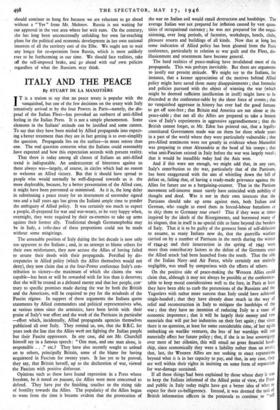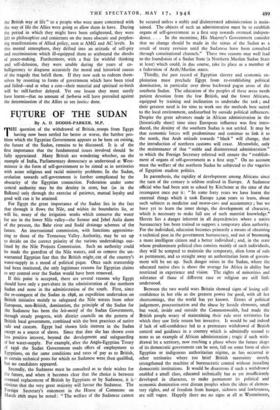ITALY AND THE PEACE
By STUART DE LA MANOTIERE
IT is a truism to say that no peace treaty is popular with the vanquished, but one of the few decisions on the treaty with Italy tentatively arrived at by the four Powers in Paris—namely, the dis- posal of the Italian Fleet—has provoked an outburst of anti-Allied feeling in the Italian Press. It is not a simple phenomenon. Some elements in the Italians' attitude can be justified and some cannot. To say that they have been misled by Allied propaganda into expect- ing a better treatment than they are in fact getting is to over-simplify the question. Propaganda lies on the surface—in more senses than one. The real question concerns what the Italians could reasonably have expected and how this expectation accords with present reality.
That there is today among all classes of Italians an anti-Allied trend is indisputable. An undercurrent of bitterness against us there always was—largely, of course, in circles which had no reason to welcome an Allied victory. But that it should have spread to people who would normally be well-disposed towards us is the more deplorable, because, by a better presentation of the Allied case, it might have been prevented or minimised. As it is, the long delay in substituting a peace treaty for an instrument of surrender signed two and a half years ago has given the Italiani ample time to ponder the ambiguity of Allied policy. It was certainly too much to expect a people, ill-prepared for war and war-weary, to be very happy when, overnight, they were required by their ex-enemies to take up arms against their former ally. Traditional though Germanophobia may be in Italy, a volte-face of these proportions could not be made without some misgivings.
The untenable position of Italy during the last decade is now only too apparent to the Italians ; and, in an attempt to blame others for their own misfortunes, they now accuse the Allies of having failed to attune their deeds with their propaganda. Fortified by dis- crepancies in Allied policy (which the Allies themselves would not deny), they now claim that at the four-Power conference Italy's con- tribution to victory—the maximum of which she claims she was capable—has been or will be rewarded with far less than it deserves; that she will be treated as a defeated enemy and that her people, con- trary to specific promises made during the war by both the British and the Americans, will be required to pay for the misdeeds of the Fascist regime. In support of these arguments the Italians quote statements by Allied commanders and political representatives who, at various times since the armistice, have been lavish with their praise of Italy's war effort and the work of the Partisans in particular —effort which, incidentally, Allied propaganda agencies themselves publicised all over Italy. They remind us, too, that the B.B.C. for years took the line that the Allies were not fighting the Italian people but their Fascist oppressors. In any case, did not Mr. Churchill himself say in a famous speech: " One man, and one man alone, is responsible . . ." etc.? They have also recently sought to unload on to others, principally Britain, some of the blame for having acquiesced in Fascism for twenty years. It has yet to be proved, they say, that Britain herself, up to the declaration of war, viewed the Fascists with positive disfavour.
Opinions such as these have found expression in a Press whose freedom, be it noted en passant, the Allies were most concerned to defend. They have put the finishing touches to the rising tide of hostility towards the Allies. The popularity of the Allies began to wane from the time it became evident that the prosecution of the war on Italian soil would entail destruction and hardships. The average Italian was not prepared for inflation caused by vast quan-
tities of occupational currency ; he was net prepared -for the requi-
sitioning, over long periods, of factories, workshops, hotels, clubs, pleasure resorts and buildings of all kinds. Now that at long last some indication of Allied policy has been gleaned from the Paris conference, particularly in relation to war guilt and the Fleet, dis- illusionment and resentment have become general.
The hard realities of peace-making have invalidated most of the propaganda. This was perhaps inevitable. But there are arguments to justify our preseht attitude. We might say to the Italians, for instance, that a keener appreciation of the motives behind Allied policy might have saved them many disappointments ; that formulas and policies pursued with the object of winning the war (which might be deemed sufficient justification in itself) might have to be discarded at the conference-table by the sheer force of events ; that no vanquished aggressor in history has ever had the good fortune to get off scot-free ; that Britain and America are not alone at the peace-table ; that not all the Allies are prepared to take a lenient view of Italy's experiments in aggressive aggrandisement ; that the British cannot forget, as Mr. Eden has pointed out, that a legally- constituted Government made war on them for three whole years in a part of the world where they were particularly vulnerable ; that pro-Allied sentiments were not greatly in evidence when Mussolini was preparing to enter Alexandria at the head of his troops ; that what anti-Fascism existed in Italy before the war was largely vocal ; that it would be inaudible today had the Axis won.
And if this were not enough, we might add that, in any case, Italy's contribution to the war, particularly that of the Partisans, has been exaggerated with the aim of whittling down the bill of defeat or, failing that, of having a ready-made grievance against the Allies for future use as a bargaining-counter. That in the Partisan movement self-interest must surely have coincided with nobility of thought and deed. Was it not in their own interests that the Partisans should take up arms against men, both Italian and German, who sought to enrol them in forced-labour battalions or to ship them to Germany tout court? That if they were at times inspired by the ideals of the Risorgimento, and borrowed many of its slogans, that in itself is no special title to fame beyond the borders of Italy. That it is to be guilty of the grossest form of self-delusion to assume, as many Italians now do, that the guerrilla warfare carried on by a number of Partisans in the north during the winter of 5944-45 and their insurrection in the spring of 1945 were more than contributory factors in the defeat of the Germans once the Allied attack had been launched from the south. That the rale of the Italian Navy and Air Force, while certainly not entirely negligible, was small by comparison with the efforts of others.
On the positive side of peace-making the Western Allies could claim that, although it may not always be possible at the conference- table to keep moral considerations well to the fore, in Paris at least they have been able to curb the pretensions of the Russians and the Yugoslays with rather more success than Italy could have achieved single-handed ; that they have already done much in the way of relief and reconstruction in Italy to mitigate the hardships of the war ; that they have no intention of reducing Italy to a state of economic impotence ; that it will be largely their money and raw materials that will put her industries on their feet again ; that since there is no question, at least for some considerable time, of her again embarking on warlike ventures, the loss of her warships will not
materially affect her future policy; that, if she is to lose sovereignty over most of her colonies, this will entail no great financial hard-
ship, since economically they were a liability rather than an asset ; that, last, the Western Allies are not seeking to exact reparations beyond what it is in her capacity to pay, and that, in any case, they are well within their rights in insisting on some form.of reparation for war-damage sustained.
If all these things had been explained by those whose duty it was to keep the Italians informed of the Allied point of view, the Press and public in Italy today might have got a better idea of what to expect for their co-belligerency. Instead, it was deemed the task of British information officers in the peninsula to continue to "sell
the British way of life " to a people who were more concerned with the way of life the Allies were going to allow them to have. During the period in which they might have been enlightened, they were left to philosophise and conjecture on the more obscure and perplex- ing manifestations of Allied policy, seen at AMG and AC levels. In this mental atmosphere, they drifted into an attitude of self-pity and recrimination which ill-equipped them to withstand the shocks of peace-making. Furthermore, with a flair for wishful thinking and, self-delusion, they were unable during the years of co- belligerency to diagnose accurately the moral and historical causes of the tragedy that befell them. If they now seek to redeem them- selves by resorting to forms of government which have been tried and failed—and at what a cost—their material and spiritual re-birth will be still further delayed. Yet one lesson they must surely have learnt—that no amount of furberia will have prevailed against the determination of the Allies to see justice done. -































 Previous page
Previous page